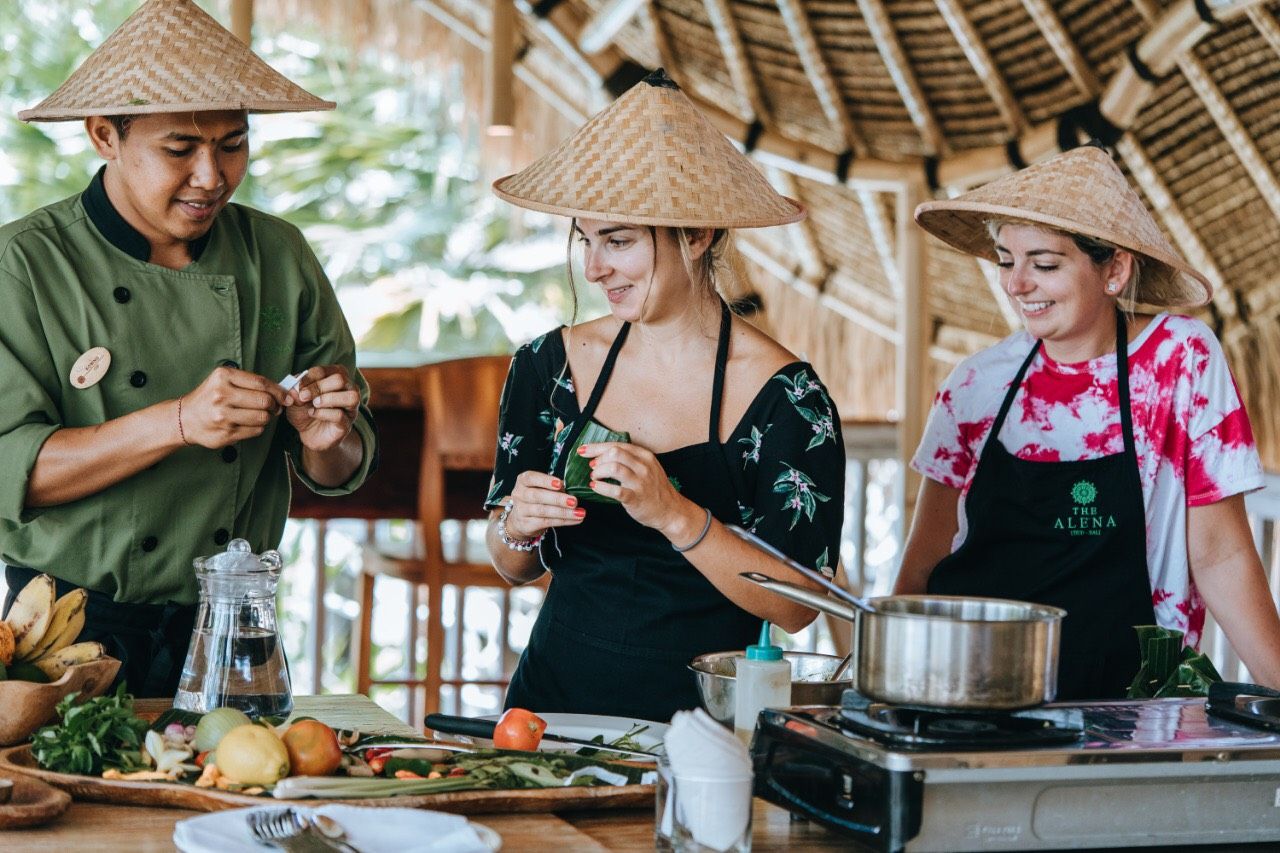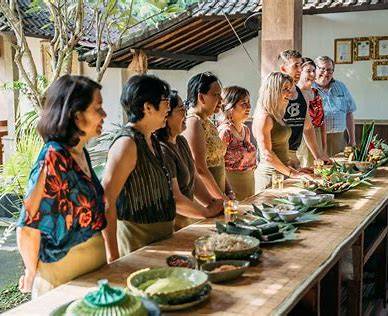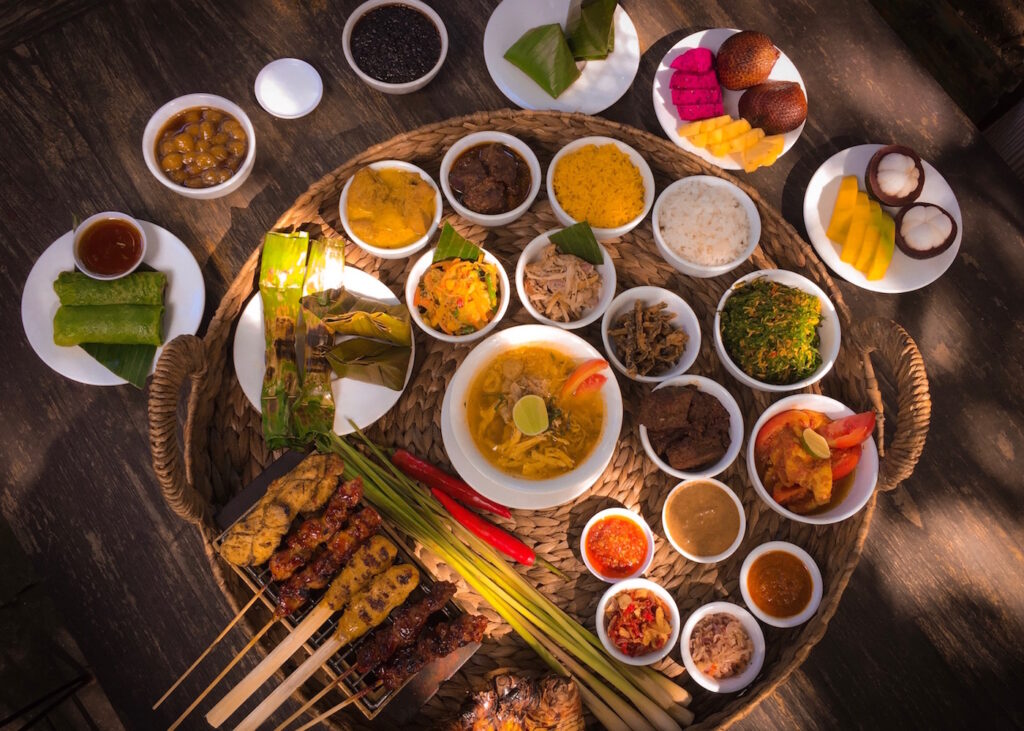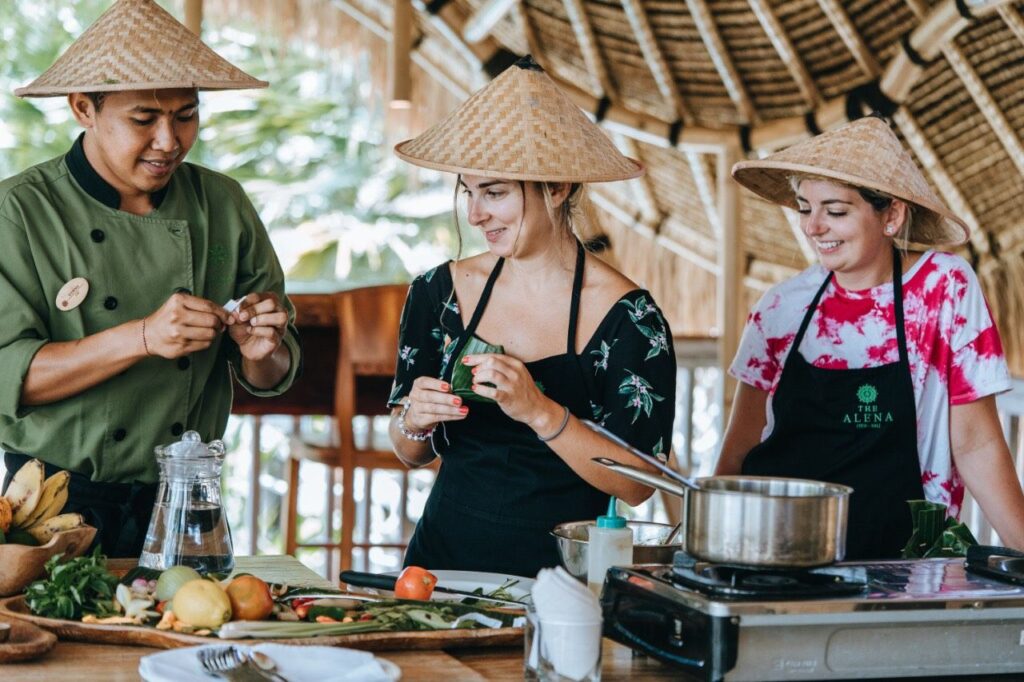Discover the Art of Balinese Cooking

Discover the Art of Balinese Cooking. Bali, known as the Island of the Gods, is celebrated not only for its stunning landscapes but also for its rich culinary heritage. Taking a Balinese cooking class is one of the most immersive and rewarding ways to experience the island’s culture, connecting you with its history, flavors, and traditions. These classes go beyond recipes—they offer a hands-on introduction to the unique ingredients, cooking techniques, and rituals that define Balinese cuisine.
This article explores what makes Balinese cooking classes so special, what you can expect from a class, and why it’s a must-do activity for anyone visiting the island.
1. Why Choose a Balinese Cooking Class?

A Balinese cooking class provides a unique window into the heart of the island’s culture. Balinese cuisine is deeply rooted in Hindu traditions, and its flavors are a reflection of the island’s diverse natural resources and rich history. By joining a cooking class, you’ll not only learn to prepare delicious meals but also gain insights into:
- The cultural significance of Balinese dishes.
- Traditional cooking methods passed down through generations.
- The symbolic meaning of food in rituals and ceremonies.
This experience is perfect for food lovers, cultural enthusiasts, and even professional chefs looking to expand their culinary repertoire.
2. What Makes Balinese Cuisine Unique?

Balinese food is a harmonious blend of flavors, balancing sweet, savory, spicy, and tangy elements. Key ingredients include:
- Spices: A mix of turmeric, ginger, galangal, and candlenut.
- Herbs: Lemongrass, kaffir lime leaves, and pandan.
- Protein: Chicken, pork, fish, and tofu.
- Staples: Rice, coconut milk, and palm sugar.
Signature dishes such as Babi Guling (suckling pig), Ayam Betutu (slow-cooked chicken), and Lawar (a spicy meat salad) exemplify the bold and aromatic flavors of Balinese cuisine.
3. What to Expect in a Balinese Cooking Class
Balinese cooking classes typically offer a comprehensive culinary journey, including:
a. A Visit to the Local Market
Many classes begin with a trip to a traditional market, where participants can learn about the ingredients that form the backbone of Balinese cooking. Here, you’ll:
- Explore vibrant stalls filled with fresh produce, spices, and herbs.
- Interact with local vendors to understand the origins of ingredients.
- Select the freshest items for the recipes you’ll prepare.
b. Hands-On Cooking Experience
After gathering ingredients, you’ll head to a traditional kitchen or outdoor cooking space. Under the guidance of expert chefs or local cooks, you’ll:
- Learn to grind spices into a paste using a mortar and pestle.
- Master cooking techniques like steaming, frying, and grilling.
- Create several dishes, from appetizers to desserts.
c. Cultural Insights
Instructors often share stories about the cultural and ceremonial significance of each dish. For example, you might learn how offerings made with rice are prepared for temple ceremonies.
d. Feast on Your Creations
At the end of the class, participants gather to enjoy the fruits of their labor. This communal meal is a delightful way to savor your dishes and celebrate the flavors of Bali.
4. Popular Dishes You’ll Learn to Make
A typical Balinese cooking class includes a variety of dishes that showcase the island’s culinary diversity:
- Sate Lilit: Minced meat skewers wrapped around bamboo sticks and grilled to perfection.
- Nasi Goreng: Indonesia’s iconic fried rice with a Balinese twist.
- Gado-Gado: A mixed vegetable salad with a rich peanut sauce.
- Pepes Ikan: Fish wrapped in banana leaves and steamed with spices.
- Dadar Gulung: Sweet coconut pancakes filled with palm sugar and grated coconut.
5. Best Places for a Balinese Cooking Class

Here are some renowned places offering authentic Balinese cooking classes:
a. Paon Bali Cooking Class, Ubud
Nestled in the cultural heart of Bali, this class takes you to a family home where you’ll learn recipes passed down through generations.
b. Jambangan Bali Cooking Class, Ubud
Known for its market tours and traditional kitchen setup, this class is perfect for beginners and experts alike.
c. Bumbu Bali, Nusa Dua
Led by professional chefs, this class offers a more refined experience, combining culinary techniques with cultural storytelling.
d. The Amala, Seminyak
For a luxurious experience, this cooking class is held in a serene spa resort and includes an introduction to wellness-inspired Balinese dishes.
6. Why Balinese Cooking Classes Are a Must-Do
a. Connect with Local Culture
Cooking classes are an intimate way to learn about Balinese customs, rituals, and daily life. You’ll leave with a deeper appreciation for the role food plays in their culture.
b. Practical Skills
The techniques and recipes you learn can be recreated at home, allowing you to share a taste of Bali with friends and family.
c. Memorable Experience
Beyond the food, the experience of cooking in a traditional setting, exploring markets, and dining with fellow participants creates lasting memories.
d. Sustainable Tourism
Many cooking classes support local farmers and artisans by sourcing ingredients from nearby markets, contributing to Bali’s sustainable tourism efforts.
7. Tips for a Great Cooking Class Experience
- Book in Advance: Popular classes fill up quickly, especially in tourist hubs like Ubud and Seminyak.
- Dress Comfortably: Wear light, breathable clothing and comfortable shoes for market visits and cooking.
- Ask Questions: Instructors are happy to share tips and answer questions about Balinese cuisine.
- Bring an Appetite: The class includes a full meal, so come hungry and ready to indulge.
Conclusion
Taking a Balinese cooking class is more than just a culinary adventure—it’s a cultural immersion that leaves you with new skills, unforgettable memories, and a deeper connection to Bali’s heritage. Whether you’re a seasoned chef or a curious traveler, this experience will enrich your visit to the Island of the Gods, offering a unique way to savor its flavors and traditions.










Leave a Review